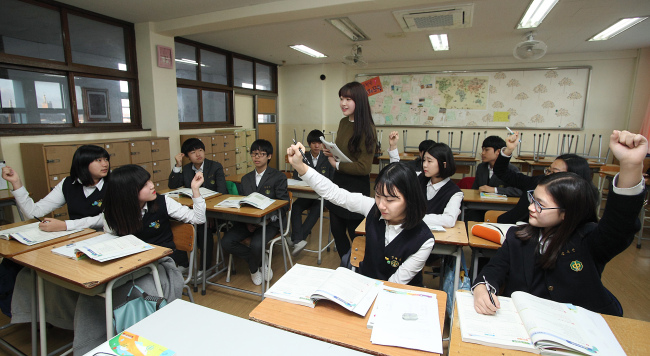Stressed teenagers in South Korea are vulnerable to temporomandibular disorders, a condition that affects the muscles and nerves surrounding the jaw, experts say.
The condition is known for pain and restricted movement, and stress is thought to be a major contributing factor, along with poor posture and overuse of the joint muscles.
According to the National Health Insurance Service, some 457,500 teenagers were treated for TMD in 2012, making up the highest proportion of all patients with the disorder that year.
Dr. Kim Seon-jong at Ewha Womans University Mokdong Hospital in Seoul said many teenagers unconsciously clench their teeth when they are stressed, putting a lot of pressure on the joint. This, along with grinding one’s teeth, can lead to TMD, he said.
The condition is known for pain and restricted movement, and stress is thought to be a major contributing factor, along with poor posture and overuse of the joint muscles.
According to the National Health Insurance Service, some 457,500 teenagers were treated for TMD in 2012, making up the highest proportion of all patients with the disorder that year.
Dr. Kim Seon-jong at Ewha Womans University Mokdong Hospital in Seoul said many teenagers unconsciously clench their teeth when they are stressed, putting a lot of pressure on the joint. This, along with grinding one’s teeth, can lead to TMD, he said.

Its symptoms include chronic facial pain, headaches, earaches and sensitive teeth when no dental problems can be found. The pain is often severe, and may last many years.
“It is also very hard for most people, regardless of their age, to think that they may have TMD when they just have a headache,” he said.
“If your teenage child suffers from headaches for no apparent reason, it is recommended that he or she gets tested for TMD and gets early treatment.”
Even if one doesn’t feel any pain, there are some warning signs.
One of the most important signs is when the jaw clicks or pops. Every joint in the body should work silently. When the jaw makes noises, it’s a sign that the lower half of the joint may not be properly aligned.
In severe cases, patients may not be able to open or close their mouths, and feel severe pain when chewing, yawning and biting.
Dr. Kim said many symptoms of TMD ― headaches, tinnitus (ringing in the ears) and fatigue ― can seriously affect a teenager’s quality of life, as well as his or her school work and sports activities.
The disorder can also change the shape of one’s face, lips and jaw line.
Nonsurgical treatments for the condition include pain relievers and muscle relaxants, which are used for a few weeks. Nonpharmaceutical treatments for TMD are also available for those with more serious forms of the disorder.
Those with jaw pain may benefit from wearing a device inserted over their teeth called “oral splints,” said Dr. Kim. Physical therapies including ultrasound and exercises can strengthen jaw muscles.
At home, stretching and massages, avoiding leaning on your chin and not biting fingernails can alleviate symptoms of the disorder.
“The best thing is to avoid stress as much as possible,” he said. “It’s important to get enough sleep and have good posture. Also, eating soft food, cutting food into small pieces and avoiding sticky or chewy food, including chewing gum, can help.”
By Claire Lee (dyc@heraldcorp.com)











![[Today’s K-pop] BTS pop-up event to come to Seoul](http://res.heraldm.com/phpwas/restmb_idxmake.php?idx=644&simg=/content/image/2024/04/17/20240417050734_0.jpg&u=)




![[KH Explains] Hyundai's full hybrid edge to pay off amid slow transition to pure EVs](http://res.heraldm.com/phpwas/restmb_idxmake.php?idx=652&simg=/content/image/2024/04/18/20240418050645_0.jpg&u=20240419100350)

![[Today’s K-pop] Zico drops snippet of collaboration with Jennie](http://res.heraldm.com/phpwas/restmb_idxmake.php?idx=642&simg=/content/image/2024/04/18/20240418050702_0.jpg&u=)